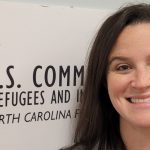Our legal team at the U.S.-Mexican border (USMBP) fights to protect the rights of migrants every day. Oftentimes, the USMBP is the only legal actor offering specialized representation, making us an essential presence on the frontier. For example, take a recent client from Iraq, who shall remain anonymous. This individual accidentally entered Mexican territory through […]
Category: International Offices
VENEZUELAN YOUTH REAP THE REWARDS OF YEARS OF DEDICATED STUDY SINCE ARRIVING IN MEXICO
Here at USCRI, nothing motivates us more than seeing our Habesha Project students achieve their dreams. Two of our students from Venezuela – Robert and Annuris – have recently given us some big reasons to be inspired. Robert, who studies at la Universidad de las Artes in Aguascalientes, successfully defended his thesis, titled “The Migrant […]
ADVANCING PROFESSIONAL DEVELOPMENT FOR YOUNG RETURNEES REINTEGRATING IN EL SALVADOR
We were proud to help young returnees in El Salvador take meaningful steps toward professional development through USCRI’s REDII program. German, Ronal, and Jefferson—studying electrical engineering, automotive mechanics, and construction, respectively—are now equipped with valuable skills from the Technological Institute of Chalatenango. Each of them dreams of launching their own business, and their dedication is […]
THE EMPRENDE PRO MUJER PROGRAM LAUNCHES IN HONDURAS
After years of planning and hard work, USCRI Honduras has launched the Emprende Pro Mujer program in collaboration with Pro Mujer and the Mennonite Social Action Commission (CASM). As of now, this innovative program will have 120 beneficiaries – all of whom are women returnees from the coast of Honduras with microenterprises that they are […]
Donation Campaign by the UDEM Committee at the Casanicolás Shelter
This month, students from the USCRI RECIBE Committee at the UDEM delivered this month’s donations to the Casanicolás shelter as part of their permanent campaign to support forcibly displaced people in their city. On this occasion, they were able to collect and deliver 100 articles of clothing, a pair of tennis shoes, and five packages […]
Fourth Student Committee Meeting
The fourth Student Committee meeting – or “Claustro” – was held on March 21st and 22nd in our home city of Aguascalientes. We were pleased to receive 11 intelligent, empathetic, and affable representatives from seven of our partner universities. The primary objective of this Claustro was to create a space for our attendees to train […]
REDII: Capacity Training and New Employment Opportunities for Kenia and Karla
With the support of USCRI, two young people, Kenia and Karla, have undergone vocational training in El Salvador. Kenia graduated from the “Entrepreneurship Incubation Program” taught by the Salvadoran Red Cross in Chalatenango. Through this program, she developed an original business model for selling typical snacks in her community. Meanwhile, in San Salvador, Karla has […]
Programa REDII: Capacitación y oportunidad de empleo para Kenia y Karla
Con el apoyo de la USCRI, dos jóvenes, Kenia Quintanilla y Karla Alemán, han recibido formación profesional en El Salvador. Kenia se graduó del «Programa de Incubación de Emprendimientos» impartido por la Cruz Roja Salvadoreña en Chalatenango. A través de este programa, desarrolló un original modelo de negocio para la venta de bocadillos típicos de […]
4° Claustro de la Red de Comités para la Integración y Bienvenida
El Cuarto Claustro de Comités, llevado a cabo los días 21 y 22 de marzo, tuvo lugar en la ciudad de Aguascalientes, con la participación de 11 representantes de los Comités Estudiantiles de siete universidades aliadas. El principal objetivo del Claustro fue crear espacios de capacitación y vinculación entre los asistentes, todo esto con la […]
Campaña de donación del Comité UDEM en el albergue Casanicolás
Este mes, estudiantes del Comité RECIBE de USCRI en la Universidad de Monterrey realizaron una nueva entrega de donativos como parte de su campaña permanente de apoyo a personas en situación de movilidad. En esta ocasión, lograron reunir y entregar 100 prendas de ropa, un par de tenis y cinco paquetes de toallas femeninas, gracias […]









































